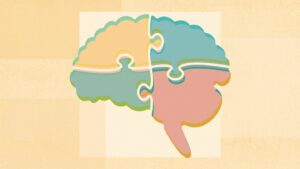If you are someone who struggles with ADHD, there is a good chance that you also experience depression at some point. It is estimated that around 60% of people who have ADHD also deal with depression. This is a statistic that you need to be aware of, especially if you are struggling with one or both of these conditions. In this blog post, we will discuss the connection between ADHD and depression, and what you can do to get help if you are dealing with both conditions.
Contents
What Are ADHD And Depression?
 ADHD and depression are both mental disorders that can have a significant impact on a person’s life. ADHD, or Attention Deficit Hyperactivity Disorder, is a condition that is characterized by problems with focus, impulsivity, and hyperactivity. Depression, on the other hand, is a mood disorder that can cause feelings of sadness, hopelessness, and fatigue.
ADHD and depression are both mental disorders that can have a significant impact on a person’s life. ADHD, or Attention Deficit Hyperactivity Disorder, is a condition that is characterized by problems with focus, impulsivity, and hyperactivity. Depression, on the other hand, is a mood disorder that can cause feelings of sadness, hopelessness, and fatigue.
Both conditions can be extremely debilitating, and they often occur together. According to studies, ADHD and depression are often comorbid, meaning that they occur together. It is estimated that about 50% of people with ADHD also have depression.
While the exact cause of this comorbidity is unknown, there are several theories as to why it may occur. It is also believed that people with any comorbidity tend to have more severe symptoms than those who only have one condition. Both disorders can impact your quality of life to a great extent.
If you or someone you know has ADHD and depression, it’s important to seek professional help. Treatment for both conditions is available, and many resources can help you manage your symptoms. With the right treatment, you can live a happy and fulfilling life.
How ADHD And Depression Are Linked?
As many as one in four children with ADHD also has depression. The good news is that treating ADHD can help relieve symptoms of depression. There are a few theories about how the two conditions might be linked:
- It could be that having ADHD makes it harder to cope with everyday life, which leads to feelings of sadness and low self-esteem.
- It could be that ADHD and depression share some of the same genetic risk factors.
- Or, it could be that having ADHD makes you more likely to have other conditions that can lead to depression, such as anxiety or sleep problems.
Along with this link or similarities, there are some separate issues as well. Depression in children with ADHD can look different than depression in other kids. For example, a child with ADHD and depression may be irritable or angry, rather than sad.
And, because hyperactivity and impulsivity are hallmarks of ADHD, a depressed child with ADHD may seem to have more energy than a child who is simply depressed. But that extra energy may be because the child can’t sit still, rather than feel happy or engaged.
So it is important to be aware of how symptoms of ADHD and depression can look in kids. If you’re concerned that your child may be depressed, talk to your doctor or mental health professional. They can help you figure out if you or your child has depression, ADHD, or both. And they can develop a treatment plan that’s right for you or someone you know.
What Are The Common Symptoms?
 As there are different types of depression, there are also different symptoms. Some people may experience all of the common symptoms while others may only experience a few. The most common symptom of depression is a feeling of sadness or emptiness that lasts for at least two weeks.
As there are different types of depression, there are also different symptoms. Some people may experience all of the common symptoms while others may only experience a few. The most common symptom of depression is a feeling of sadness or emptiness that lasts for at least two weeks.
But the symptoms of ADHD and depression can be very similar. For instance, some of the similar symptoms include:
Trouble concentrating
This is an area where ADHD and depression overlap. Both conditions can make it hard to focus or pay attention, especially if you’re feeling low. For example, if a child with ADHD is feeling depressed, they may have more trouble than usual focusing in school.
Restlessness and irritability
This is another symptom that can be seen in both ADHD and depression. When someone has ADHD, they may feel fidgety or restless. And when someone is depressed, they may feel agitated or even angry. This can be especially hard for kids, who may not know how to express their feelings.
Changes in appetite
Someone with depression may lose their appetite or overeat. And someone with ADHD may have trouble paying attention to their hunger cues. As a result, they may either skip meals or eat more than they need. And this occurs very frequently in adults.
Problems with organization
When you are depressed, it can be difficult to keep track of things. This is one area where ADHD and depression may share some similarities. People with both conditions may have trouble getting organized and keeping track of their belongings.
Fatigue or low energy
 This is one of the most common symptoms of both depression and ADHD. It can be difficult to differentiate between the two, but if you find that your fatigue is accompanied by a loss of interest in activities you used to enjoy, it may be a sign of depression. On the other hand, if your fatigue is more consistent and you have trouble focusing or completing tasks, it may be a sign of ADHD.
This is one of the most common symptoms of both depression and ADHD. It can be difficult to differentiate between the two, but if you find that your fatigue is accompanied by a loss of interest in activities you used to enjoy, it may be a sign of depression. On the other hand, if your fatigue is more consistent and you have trouble focusing or completing tasks, it may be a sign of ADHD.
So these are some common signs and symptoms that may indicate that you have both ADHD and depression. If you’re struggling with any of these issues, it’s important to talk to a mental health professional who can help you get the treatment you need. With the right support, you can manage both conditions and live a happy, fulfilling life.
Can Untreated ADHD Causes Depression?
This is commonly asked, however, the answer isn’t as simple as a yes or no. While untreated ADHD can lead to problems that may cause low self-esteem and negative emotions—and in some cases, depression—it’s important to note that not everyone with ADHD will experience depression.
There are many factors that contribute to the development of depression, and for some people with ADHD, certain symptoms may increase the risk. For example, impulsivity can lead to risky behavior, which can in turn result in negative consequences that contribute to low self-esteem.
Inattention may also make it difficult to keep up with schoolwork or perform well at a job, which can also lead to feelings of inadequacy and depression. And finally, hyperactivity can make it difficult to concentrate or sit still, which can lead to frustration and restlessness.
If you’re experiencing symptoms of ADHD and depression, it’s important to seek professional help. A mental health professional can help you understand your symptoms and develop a treatment plan that’s right for you. Treatment may include medication, therapy, or a combination of both. With treatment, you can manage your symptoms and live a happy, healthy life.
What Are The Complications?
 When you suffer from both ADHD and depression, it can be difficult to function in your everyday life. And it can cause various complications, such as:
When you suffer from both ADHD and depression, it can be difficult to function in your everyday life. And it can cause various complications, such as:
- Lack of motivation: This is one of the most common consequences of ADHD, and it can be made worse by depression. When you’re depressed, it’s hard to find the motivation to do anything, let alone things that are important to your health and well-being.
- Feelings of worthlessness or hopelessness: People with ADHD and depression might feel like they can’t do anything right, or that nothing will ever get better. These negative thought patterns can be extremely harmful and make it even harder to manage ADHD symptoms.
- Sleep problems: ADHD and depression, are both impacts your sleep. Depression can cause insomnia, while ADHD can make it difficult to fall asleep and stay asleep. This can lead to fatigue, which can make both conditions worse.
- Substance abuse: This seems very common in people with ADHD as they self-medicate to cope with their symptoms. But, depression can also lead to substance abuse problems.
- Thoughts of self-harm: One of the negative complications that come with comorbid conditions like ADHD and depression is an increased risk of self-harm or suicidal thoughts.
If you’re struggling with these kinds of thoughts, it’s important to reach out for help from a mental health professional. Because both conditions are already individually difficult to manage, it’s important to get treatment for both at the same time. With proper treatment, you can start to feel better and manage your symptoms more effectively.
How To Manage ADHD And Depression?
Managing both conditions is an essential part of life. Here are some tips:
Talk to a professional
It is important to communicate with your physician about both conditions. This will help ensure that you are receiving the best possible care. Professionals can also offer you tips and resources for managing both ADHD and depression. In fact, talking to them is the first step in managing both conditions.
Use a planner
A planner can be a helpful tool for keeping track of appointments, medications, and other important tasks. This can help you stay on top of your mental health and avoid feeling overwhelmed. For example, you may want to consider using a daily or weekly planner to help you stay organized.
Be active
Being active in your daily routine is important, although this might be difficult at first if you’re feeling depressed. Exercise releases endorphins, which have mood-boosting effects. Taking a brisk walk in your neighborhood or going for a swim at the local pool can help alleviate symptoms of depression and improve your overall mood.
Create a support system
A support system can be hugely beneficial for people with ADHD and depression. Family, friends, and online support groups can provide much-needed understanding and encouragement. When creating a support system, it’s important to choose people who will be supportive and nonjudgmental. Because mental illnesses can be taboo subjects, it’s also important to find people who you can be open and honest with about your struggles.
Take care of yourself
 This is important for everyone, but it’s especially important if you have ADHD and depression. Make sure to schedule time for activities that make you happy and help you relax. This could be anything from reading, going for walks, or listening to music. Taking care of your physical health is also key, so make sure to eat healthily and sleep enough to avoid burnout.
This is important for everyone, but it’s especially important if you have ADHD and depression. Make sure to schedule time for activities that make you happy and help you relax. This could be anything from reading, going for walks, or listening to music. Taking care of your physical health is also key, so make sure to eat healthily and sleep enough to avoid burnout.
So all in all, if you have ADHD and depression, it’s important to be mindful of the connection between the two. Be sure to take care of yourself and seek professional help if needed. With the right support, you can manage both conditions and live a happy, fulfilling life. This is important for everyone, but it’s especially important if you have ADHD and depression.
Conclusion
To conclude, ADHD and depression are two very real and serious conditions that can have a profound impact on an individual’s life. While there is no one-size-fits-all solution, understanding the connection between the two can help to develop more targeted and effective treatment plans. You should always consult with a mental health professional if you think you may be suffering from either condition.
If you or someone you know is struggling with ADHD and/or depression, don’t hesitate to reach out to a professional. You can also contact Therapy Mantra for more information. We have a team of professional therapists who can provide you with support and guidance. Contact us today to learn more about our services. You can also book an online therapy session or download our free Android or iOS app.


